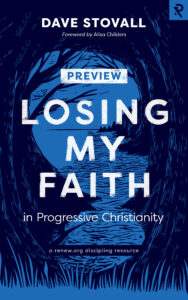How well do you handle unresolved questions? When the answer is as pointed as a ball of spaghetti noodles—“Well, that’s a good question . . . various answers have been proposed . . . can’t say with any certainty”—do you feel more pacified or perturbed?
A group known for making peace with unresolved questions are the “agnostics.” Two building blocks that make up the word “agnostic” are “a” (meaning “no”) and “gnosis” (meaning “knowledge”). When it comes to the big questions, especially about God and God’s existence, agnostics admittedly don’t know and feel fine not knowing. Why get so uptight about questions to which we may never get a sure answer?
A 19th-century American politician named Robert Ingersoll was such a famed orator on behalf of agnosticism that he is known as “the great agnostic.” A critic of Christianity, Ingersoll protested that the Christian God was squeamish about questions. He explained, “According to these, religious people, God is infinitely above us in every respect, infinitely merciful, and yet he cannot bear to hear a poor finite man honestly question his existence.”[1] The agnostic pities the Christian, seen as meekly muffling the urge to ask what they’re really thinking.
On hearing that Robert Ingersoll was the son of a preacher, we might picture the elder Ingersoll as an austere reverend whose eyes bulged and ears reddened at his son’s inquisitive questions about God and the Bible. Actually, Reverend Ingersoll was scandalously open-minded for his congregations—even put on trial by one church for doctrinal ambiguity. When the son grew up to accuse Christians of criminalizing honest questions, he had the receipts.
“When the son grew up to accuse Christians of criminalizing honest questions, he had the receipts.”
But is God as question-averse as his followers often are? Though Ingersoll was accurate about the Christians of his childhood, was he right about their God?
To answer, let’s explore five questions regularly asked of God in the Old Testament, how God responded, and what his responses teach us about questioning God.
1. Really?
One type of question throughout the Old Testament is asking God if he really meant what he said. Sometimes this is asked out of a desire for clarity—other times as a snarky second guess. An example of honest curiosity is Abram’s “How can I know?” when God showed him the land he would inherit (Genesis 15:8). Didn’t such a promise violate how the world works—a fortified region given into the hands of a foreign nomad?
Another set of “really” questions call us deeper into the jungle, as they ponder why God’s statements violate how we expect God to work. When God tells Abraham of his plans to smite two nearby cities, Sodom and Gomorrah, Abraham had trouble believing. “Will you sweep away the righteous with the wicked? . . . What if there are fifty righteous people in the city? . . . Far be it from you! Will not the Judge of all the earth do right?” (Genesis 18:23-25*).
Similarly, after God emancipated the Israelites from Egyptian slavery and they responded by crafting a gold idol and thanking it for setting them free, Moses had to talk God down from completely destroying the Israelites: “Lord, why should your anger burn against your people?” (Exodus 32:11b). Really, God? Twice the prophet Ezekiel asked the same question: “Will you completely destroy the remnant of Israel?” (Ezekiel 9:8). Poor Job personalized the same prayer: “Your hands shaped me and made me. Will you now turn and destroy me?” The upside is that these questions assume, even when our problem is with God, so must be the solution.
Questioning God: “Your hands shaped me and made me. Will you now turn and destroy me?”
Then sometimes the “really” questions take us somewhere truly dark: where the questioner sees God as the problem—and His absence as the solution. The idea is that, maybe if I ask this stumper of a question, He’ll get the hint and move on to someone who wants Him around. The first question asked of God in the Bible falls into this category. God comes to newly-minted murderer Cain and asks, “Where is your brother?” to which Cain asks, dismissively, “Am I my brother’s keeper?” No curiosity there, just annoyance. It’s a rhetorical way of asking God, “You’re asking me? Really??”
At the end of the Old Testament, the prophet Malachi describes the adolescent attitude of his fellow Israelites to God’s statements. They ask, “How have you loved us? . . . How have we defiled you? . . . How have we wearied him? . . . How are we robbing you?” The common refrain is to respond to God with an eye-rolling, “Oh really? How so?”
And how does God react to questions of “really?” Each time, whether the asker is more disoriented or defiant, God’s response is to reassure them and/or reason with them.
God enters dialogue with murderous Cain and the murmuring Israelites of Malachi’s time, laboring through language to get them to see what they’re missing. Even when neither Ezekiel nor Job get answers they’re hoping for, they do, in fact, get God to answer. Abram talks God down to saving Sodom and Gomorrah if ten righteous residents are found, and Moses talks God down from obliterating Israel and starting over. Who knew God was so open to questions? Wow, really?
Questioning God: “Abram talks God down to saving Sodom and Gomorrah if ten righteous residents are found, and Moses talks God down from obliterating Israel and starting over.”
2. Why this?
Another set of questions asked throughout the Old Testament is “Why is this happening to me?” (Genesis 25:22). When the “let my people go” speech initially backfires, Moses asks, “Why, Lord, why have you brought trouble on this people?” (Exodus 5:22). Even after the people are rescued from slavery, food runs short and Moses prays, “Why have you brought this trouble on your servant?” (Numbers 11:11). When the Israelites make it to the promised land and begin to settle it, God selects lowly Gideon to free them from the Midianites. Gideon’s reaction to being chosen is to pray, “Pardon me . . . but if the LORD is with us, why has all this happened to us?” (Judges 6:13).
Job asks God, “Why have you made me your target? Have I become a burden to you?” (Job 7:20) and, “Why then did you bring me out of the womb?” (Job 10:18). The psalmist regularly questions why God allows this or that, asking, “Why, LORD, do you stand far off? Why do you hide yourself in times of trouble?” (Psalm 10:1). In a prayer echoed by Jesus on the cross, the psalmist cries out, “My God, my God, why have you forsaken me?” (Psalm 22:1a).
Some scenarios just don’t seem plausible under God’s heaven, although here we are: “Why does the way of the wicked prosper? Why do all the faithless live at ease?” asks Jeremiah (Jeremiah 12:1b). Isaiah wonders why a good God hardens hearts: “Why, LORD, do you make us wander from your ways and harden our hearts so we do not revere you?” (Isaiah 63:17). Habakkuk asks,
Questioning God: “Why does the way of the wicked prosper? Why do all the faithless live at ease?”
“Your eyes are too pure to look on evil; you cannot tolerate wrongdoing. Why then do you tolerate the treacherous? Why are you silent while the wicked swallow up those more righteous than themselves?” (Habakkuk 1:13)
Sometimes God leaves “why” question unanswered (as in many psalms), while other times he explains how the present suffering fits in his overall plan. To his “why” questions, Habakkuk learns that God is punishing faithless Israel through the Babylonian Empire. When Habakkuk answers that the Babylonians are even more godless than Israel has become (an even more shocked “why?!”), God assures Habakkuk that, afterward, God will judge Babylon too. Each time, God apparently welcomes the tough questions, sometimes engaging them with explanation.
3. Shouldn’t you ___?
Close on the heels of asking God “why” is asking “when.” Since things aren’t the way they ought to be, when will God do His thing? Won’t He do something? This is King Jehoshaphat’s “Our God, will you not judge them?” when he sees the Ammonite and Moabite armies gathering to attack (2 Chronicles 20:12). Psalmist and prophet alike ask, “How long, Lord?” (see Psalm 13:1-2; 74:10; Isaiah 6:11; Jeremiah 12:4; Habakkuk 1:2; Zechariah 1:12.)
Sometimes God has made promises long before, and the question becomes, “How long will it be before these astonishing things are fulfilled?” (Daniel 12:6b). More often than not, the answer to “How long?” is longer than we want, but, as with restless, reeling nights, eventually: “Even in darkness light dawns for the upright, for those who are gracious and compassionate and righteous” (Psalm 112:4).
Questioning God: “Our God, will you not judge them?”
4. Why me?
Sometimes God chooses individuals to bear, in the words of the apostle Paul, a special “weight of glory” (2 Corinthians 4:17, KJV). When God picked Moses to lead the Israelites to freedom, Moses asked in response, “Who am I that I should go to Pharaoh and bring the Israelites out of Egypt?” (Exodus 3:11). Likewise, Gideon’s response to being picked as an Israelite judge: “Pardon me . . . but how can I save Israel? My clan is the weakest in Manasseh, and I am the least in my family” (Judges 6:15).
The humility of King David before God—“Who am I, LORD God, and what is my family, that you have brought me this far?” (1 Chronicles 17:16)—trickled down to his son Solomon when told he would build a temple for God: “Who then am I to build a temple for him?” (2 Chronicles 2:6). “Why me?” is a prayer all thoughtful humans can pray: “What is mankind that you are mindful of them, human beings that you care for them?” (Psalm 8:4).
In every case, we see God answer by doing something amazing—underscoring his greatness through the ordinariness of the human tool and validating their “why me” wonder. Ultimately, those who follow His call He lifts out of ordinariness as He restores us to our original intended glory, not as puppets and tools but sons and daughters (Romans 8:18-21).
Questioning God: “Who then am I to build a temple for him?”
5. Should I ___?
This might be the least surprising question asked of God in the Old Testament. When faced with a difficult decision or ethical dilemma, God’s followers have been going to Him for guidance for thousands of years.
When the people Moses liberated turned on him, he cried out to God, “What am I to do with these people? They are almost ready to stone me” (Exodus 17:4). After a shocking military defeat, Joshua asked God why it had happened and what needed to come next (Joshua 7:6-9). David asked God whether he should rescue a city oppressed by the Philistines (1 Samuel 23:1-2). Jehoshaphat asked God what to do when armies gathered to attack his nation (2 Chronicles 20:1-4).
Each time, God responds with next steps, showing Himself to be a Father who likes to guide His children. Sometimes those steps are painful, but they always lead back to “right paths for his name’s sake” (Psalm 23:3).
Questioning God: “What am I to do with these people? They are almost ready to stone me”
Conclusion
Why is God so surprisingly responsive toward honest questions? The only plausible reason seems to be that He desires dialogue and relationship. There is a remarkable grace in God’s inviting ignorant, often-suspicious interrogators into the living room for a dialogue. We would do well to respond to Him in kind, knowing that wisdom doesn’t come from demanding immediate answers and quick resolutions, but from walking with the Wise.
It’s when we’re clear that there’s a God, and that He is good and desires relationship with us—in other words, when we’re not agnostic about God—that we can be a bit more agnostic when it comes to our need for immediate, specific answers. We may not know this or that, but we know God—and thankfully He knows the answers we don’t.[3]
[1] Robert G. Ingersoll, “Individuality,” Project Gutenberg, January 25, 2013, https://www.gutenberg.org/files/38098/38098-h/38098-h.htm.
[2] Every Scripture quote, unless otherwise noted, is from the NIV.
[3] For a helpful video exploring how, amid the problem of evil, we can trust God who knows the answers we don’t, see Os Guinness, “What Is Evil? Os Guinness Talks with The Veritas Forum,” https://www.youtube.com/watch?v=n7v7fYNP3Qc.











